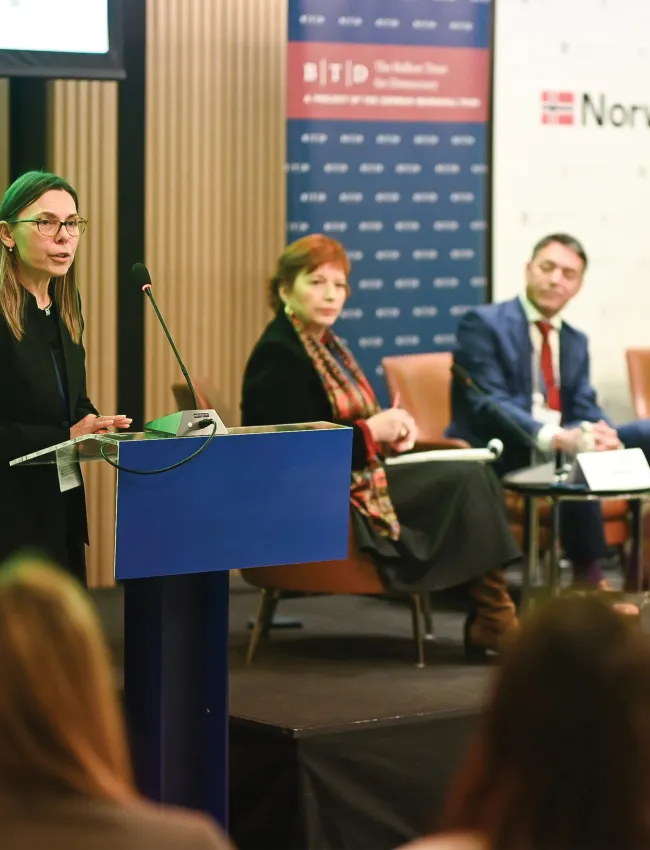Balkan Trust for Democracy

The Balkan Trust for Democracy (BTD) was founded in 2003 as an innovative and flexible transatlantic public-private partnership in support of democratic consolidation in Southeast Europe. With its civil society support, policy dialogues, and leadership development work, BTD enhances citizens’ engagement in democracy building and supports regional collaboration in the Western Balkans.
Being part of the GMF network, with its headquarters in Washington and seven offices in Europe, BTD is uniquely positioned to generate ideas, create networks, and build consensus on Balkan issues from a broad, multi-stakeholder perspective by connecting the region’s leaders and activists with EU and US institutions and individuals. BTD is committed to developing the next generation of Balkan leaders and activists through a wide range of opportunities to train, connect, and empower organizations and individuals who will be agents of change and generators of ideas, leadership, and hope in their societies.
In 2005, USAID presented BTD with the annual Global Development Alliance Excellence Award. The award recognized BTD’s innovative public-private partnership model that strengthens citizens’ involvement in democracy building and supports cross-border collaboration in Southeastern Europe. It acknowledged BTD’s founding partners—USAID, GMF, and the Charles Stewart Mott Foundation—as well as subsequent partners.
Since its inception, following donor contributions have made BTD a true transatlantic partnership:
- Compagnia di San Paolo
- Czech Ministry of Foreign Affairs
- British Foreign and Commonwealth Office
- Danish Ministry of Foreign Affairs
- Embassy of the Kingdom of the Netherlands, Belgrade, Serbia
- Greek Ministry of Foreign Affairs
- Norwegian Ministry of Foreign Affairs
- Royal Norwegian Embassy in Belgrade
- Robert Bosch Stiftung
- Rockefeller Brothers Fund
- Swedish International Development Cooperation Agency
- Tipping Point Foundation
Grants, Policy, and Leadership
BTD supports the democratic consolidation and Euro-Atlantic integration of the Balkans by assisting reform processes and strengthening regional collaboration. It awards grants to civil society organizations to support projects on democracy and good governance, the rule of law, policy dialogue and networking, regional cooperation, and EU integration.
BTD’s grantmaking activities focus primarily on the Western Balkan countries. BTD also supports relevant cross-border and regional initiatives that include civil society stakeholders from other European countries.
How to Apply
Organizations that are interested in receiving BTD grants please review BTD Grantmaking procedures. BTD does not recommend that organizations develop full project proposals unless invited to do so by BTD program staff.
BTD is dedicated to accelerating the Balkans’ integration into Euro-Atlantic structures and to raising the international profile of the region. It strengthens transatlantic cooperation through convening policy dialogues between civic, political, and business leaders from the Balkans and their counterparts in Europe and the United States.
In addition to local and regional convening, press interviews, and published articles, specific examples of this work include:
- Kosovo-Serbia Professional Exchange Program - a series of activities for mid-career Kosovan and Serbian professionals from think tanks, civil society organizations, and universities. BTD implemented the program with the support of the Foreign and Commonwealth Office of the United Kingdom.
- Travel to Europe Program - a joint initiative the Robert Bosch Foundation and GMF, launched in 2007, that enabled over 2,000 university students from the Western Balkan countries to visit other European countries and to expand their knowledge and understanding of the EU.
BTD is committed to developing the next generation of Balkan leaders by providing them with a wide range of leadership and networking opportunities across Europe and the United States. Programs that BTD implements throughout the Balkan region include: the Young Transatlantic Network, the Marshall Memorial Fellowship Program, and the Transatlantic Inclusion Leaders Network. These enable established, mid-career, and emerging leaders to hone their leadership and professional skills as well as to forge partnerships that develop sustainable solutions to the region’s problems.
Related Work
20 Years of Partnership & Cooperation Award
Gordana Delic, representing the Balkan Trust for Democracy (BTD) of the German Marshall Fund of the United States was recently presented with an award of appreciation by Sonja Licht, President of The Foundation BFPE for a Responsible Society (BFPE). The award was given in honor of BFPE's 20th anniversary. As an organization dedicated to supporting region's civil society, BTD is proud to receive recognition for its commitment to fostering long-term partnerships that generate ideas, create networks, and build consensus on Balkan issues from a broad, multi-stakeholder perspective.